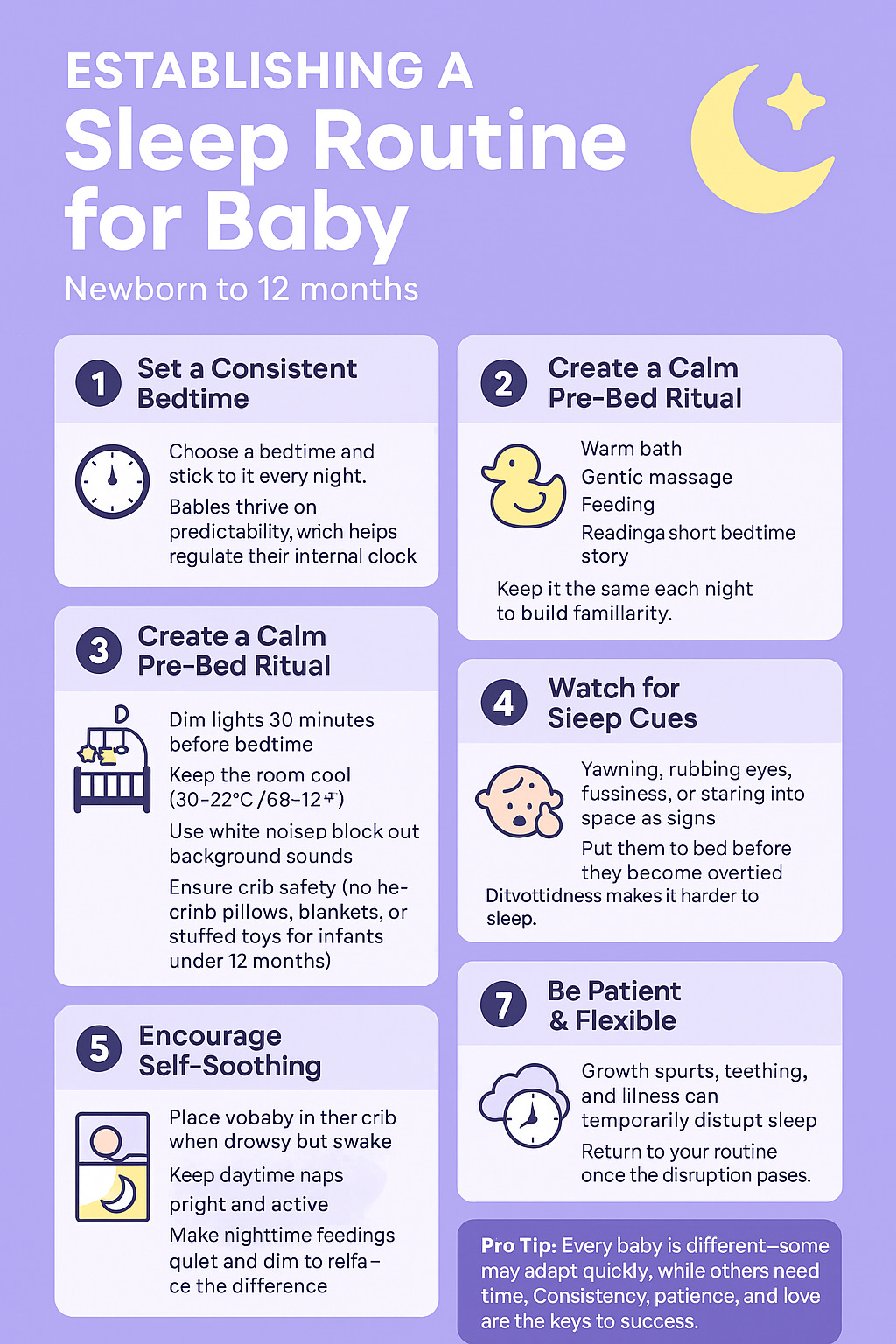Sleep is vital for a baby’s growth, brain development, and emotional well-being. While newborns don’t have a set sleep pattern, introducing a gentle and consistent routine early on can help them settle into predictable sleep habits as they grow.
In this guide, we’ll cover why a sleep routine matters, when to start, and step-by-step tips to help your baby—and you—get better rest.
🍼 Why a Sleep Routine is Important
- Supports Brain Development: Quality sleep promotes memory, learning, and emotional regulation.
- Improves Mood: Well-rested babies are generally less fussy and more alert during wake times.
- Reduces Night Wakings: Babies who learn to self-soothe tend to fall back asleep without needing constant help.
- Benefits Parents: Predictable sleep patterns make it easier for parents to plan rest and daily tasks.
📅 When to Start
- 0–3 Months: Focus on flexible routines and recognizing sleep cues rather than strict schedules.
- 3–6 Months: Most babies can begin adapting to a consistent bedtime and nap routine.
- 6–12 Months: A set routine becomes more effective as circadian rhythms mature.
🛏 Step-by-Step: How to Create a Sleep Routine
1. Set a Consistent Bedtime
- Choose a bedtime (e.g., 7:30–8:00 PM) and stick to it.
- Consistency helps regulate the baby’s internal body clock.
2. Create a Calming Pre-Bed Ritual
- Keep the same sequence every night so your baby associates these steps with sleep.
- Example: Bath → Massage → Pajamas → Feed → Book → Lullaby → Lights out.
3. Optimize the Sleep Environment
- Room temperature: 20–22°C (68–72°F).
- Lighting: Dim lights 30 minutes before bedtime.
- Sound: Use white noise or soft lullabies to mask household noise.
- Crib Safety: Firm mattress, fitted sheet, no loose bedding, pillows, or stuffed animals.
4. Learn & Respond to Sleep Cues
- Common signs: Rubbing eyes, yawning, zoning out, irritability.
- Put your baby to bed before they are overtired, as this can make falling asleep harder.
5. Encourage Self-Soothing
- Place your baby in their crib when they’re drowsy but still awake.
- Over time, they’ll learn to fall asleep without being rocked or fed.
6. Differentiate Between Day and Night
- During the day: Keep lights bright and engage in playful activities.
- At night: Keep feedings quiet, avoid eye contact, and limit stimulation.
7. Be Flexible
- Growth spurts, teething, illness, or travel can disrupt sleep temporarily.
- Resume your routine once things stabilize.
💤 Extra Tips for Better Baby Sleep
- Avoid screen exposure for both baby and parents during bedtime.
- Offer a “dream feed” (late-night feeding before you go to bed) to help reduce middle-of-the-night wake-ups for some babies.
- Keep naps age-appropriate—too much daytime sleep can affect night sleep.
✅ Final Note: Establishing a baby sleep routine takes time. The key is patience, consistency, and comfort. Every baby is unique—adapt these tips to suit your child’s personality and needs.


